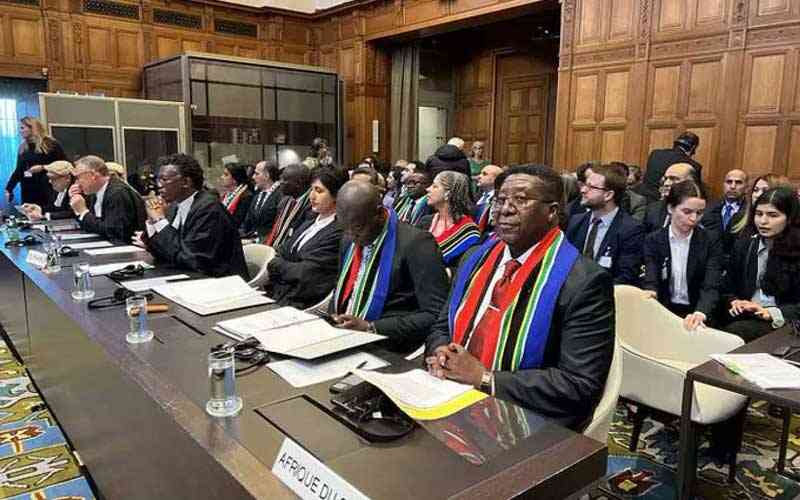
The two sides have had their day in court — one day each, actually.
The seventeen judges of the International Court of Justice (ICJ) have now retired to consider what interim decisions they should make on South Africa’s accusation that Israel’s actions in the Gaza Strip amount to the crime of genocide. Is this just a waste of time?
The response of Israel’s mass media and most Israeli politicians has been to treat the case as simple anti-semitism, but the fact that the government hired top-flight international lawyers to defend itself before the court reveals a different reality.
The accusations of anti-semitism are ridiculous.
The court’s other recent decisions were against Burma (for attempted genocide against the Rohingya), against Russia (for falsely claiming that an alleged genocide by Ukraine justified the Russian invasion in 2022), and against Sudan’s military regime (for slaughtering ethnically African tribes.)
No Jews there.
Moreover, Israel is not exposed to any real risk of punishment.
Even if the ICJ finds that South Africa has a good case, any action the court takes will be unenforceable if the United States uses its veto on the Security Council.
- Patent rights — reap more benefits, profits
- The Fiddler: The body politic
- Quality helps Trojan reach Axis Solutions Cup semis
- Why African scientists are studying the genes of African species, how they do it
Keep Reading
Yet by sending its lawyers to The Hague to contest the charges, Israel has effectively recognised the court’s jurisdiction. Something real is at stake here, even if it is only Israel’s reputation.
The cynics think such things do not matter.
The experts know better.
The people bringing the case before the ICJ are experts, too, and they are probably not just South Africans.
There were almost certainly quiet discussions between leading members of the BRICS (the organisation that aspires to become the international voice of the developing countries) before the task was given to South Africa. It’s a good choice, because South Africa has:
lots of very good lawyers;
a legal system that remained largely uncorrupted even through the worst days of apartheid; and
a population that can spot another apartheid-like political system (like that in ‘Greater Israel’) in a single glance.
Nevertheless, proving the crime of genocide is so hard that there are few convictions.
It’s usually fairly easy to show that people are being killed in large numbers, and even that it is being done in a negligent fashion, but the crime of genocide requires intent.
"It's not sufficient to show you killed people en masse,” explained Nick Kaufman, a British-born Israeli lawyer with much experience arguing before international tribunals.
“You have to show that the government's intent was to kill people en masse with the intent of wiping out their ethnic group wholly or partly.”
‘Intent’ is hard to prove because it is impossible to read other people’s minds. Very few people will say they are planning a genocide, even if that is what they intend.
It usually has to be deduced from the statements and actions of those in power.
Admittedly, Israel is a bit of an exception in this regard, in the sense that the extreme-right religious and nationalist politicians on whom Prime Minister Binyamin Netanyahu’s coalition depends for its survival do say the most amazing things.
Indeed, the South African lawyers could even quote Israeli President Isaac Herzog saying about the residents of the Gaza Strip: “It’s an entire nation out there that is responsible. This rhetoric about civilians not aware, not involved, it’s absolutely not true.”
The lawyers referenced Netanyahu likening the Palestinians to the Israelites' biblical enemy the Amalekites, whom God ordered the Chosen People to destroy to the last man, woman and child, and Defense Minister Yoav Gallant's statement on “fighting human animals.”
But even that does not prove intentional genocide: talk is cheap, and the court needs hard evidence. In fact, neither side actually expects a verdict of genocide — or cares much, given that past performance suggest that a final judgement is three or four years away. (The mills of justice grind slowly, etc....)
What both sides are very interested in is the interim measures that the court recommends in a few weeks’ times, in order to limit the damage while it works towards a final conclusion.
In the Russian case, for example, it ordered Moscow to stop the war in Ukraine at least until the case was settled.
Russia didn’t obey that, of course, and since it has a Security Council veto it has suffered no legal consequences.
The same is true for Israel, if the American veto still protects it — but what if the court says Israel has to stop the fighting, or at least protect civilians much better?
If President Biden is looking for an excuse to make the Israelis stop (and he probably is), this could be the pretext he needs.
- Dyer is a London-based independent journalist. His new book is titled The Shortest History of War.











